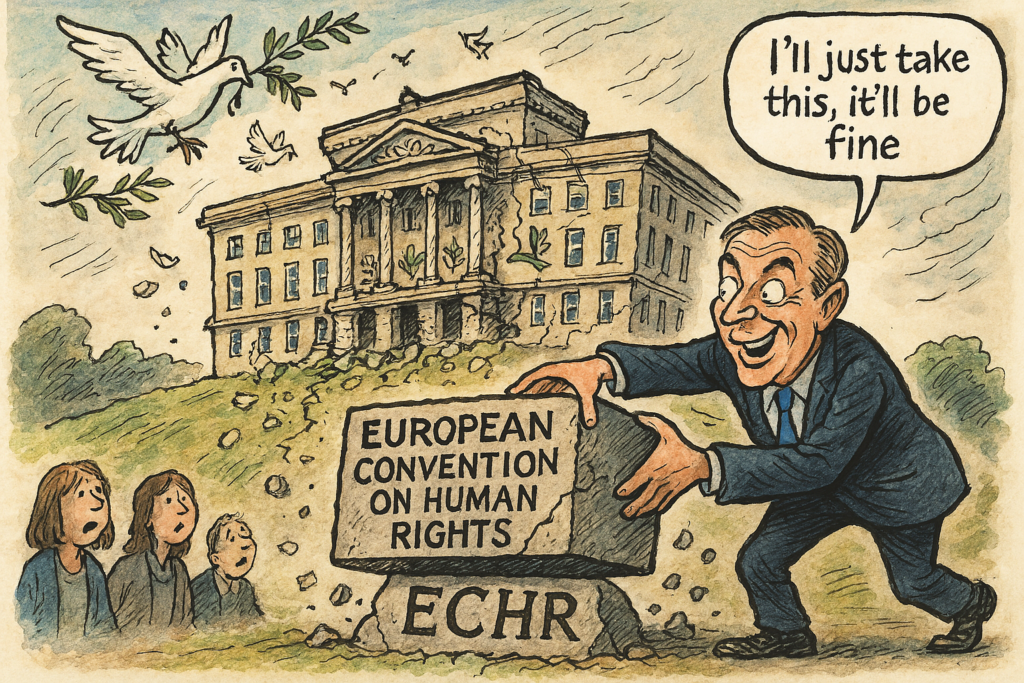A Dangerous Game: Why Attacks on the ECHR Threaten Peace in Northern Ireland
September 7, 2025
The Human Rights Consortium and its member organisations have firmly and unequivocally opposed recent proposals by Policy Exchange and Reform UK to withdraw the UK from the European Convention on Human Rights (ECHR). These proposals are not just legally reckless, they are politically incendiary. They represent a direct assault on the foundations of the Belfast/Good Friday Agreement and a betrayal of the commitments that brought peace to Northern Ireland.
It is very clear that this is not a technical debate about sovereignty or legal drafting. It is a deliberate attempt to dismantle the human rights architecture that underpins one of the most successful peace processes in modern history. The ECHR is not an optional extra, it is a cornerstone of the Agreement, and any move to undermine it carries profound consequences.
Policy Exchange’s Misleading Narrative
Policy Exchange’s recent paper attempts to downplay the role of the ECHR in the Belfast/Good Friday Agreement by focusing narrowly on the British-Irish Agreement, the treaty element, and suggesting that because the ECHR is not named there, the UK is not bound to remain a signatory. This is a willful misreading of the Agreement.
The Belfast/Good Friday Agreement is not just a treaty, it is a comprehensive political settlement. The Multi-Party Agreement, which forms its heart, explicitly commits to the incorporation of the ECHR into Northern Ireland law and guarantees access to remedies for breaches. These are not symbolic gestures. They were hard-won assurances designed to build trust, protect rights, and ensure accountability. To suggest that these commitments can be casually rewritten or ignored is not only legally dubious, it is politically dangerous.
Reform UK’s Agenda: Rights as Collateral Damage
Reform UK’s proposals go even further, advocating for the repeal of the Human Rights Act, withdrawal from the ECHR, and suspension of other international obligations. This is not reform, it is demolition. Their agenda would strip away protections for everyone in the UK, not just migrants or asylum seekers. It would remove the right to challenge abuses, the right to privacy, and the right to a fair trial.
In Northern Ireland, these rights are not abstract—they are part of the peace settlement. They are embedded in the devolved institutions and the legal framework that sustains them. Removing the ECHR would not just breach a political promise, it would destabilise the very architecture of peace.

The Consequences of Reneging on Commitments
Any sovereign state can technically withdraw from an international agreement if it chooses, but sovereignty does not absolve responsibility. The commitments made in the Belfast/Good Friday Agreement are not casual or symbolic; they are part of a binding international accord between the UK and Ireland, lodged with the United Nations. Any move to undermine those commitments, particularly the incorporation of the ECHR into Northern Ireland law, would constitute a breach of trust with the people of Northern Ireland, with the Irish government, and with the international community. It would also have severe legal consequences for everyone in our society, with fundamental protections that we rely on every day wiped out.
Undermining the ECHR is not a procedural tweak, it is a political rupture. It risks destabilising the institutions of devolved government, eroding public confidence, and reigniting tensions that the Agreement was designed to resolve. It sends a dangerous message: that rights and protections can be sacrificed for short-term political gain. That is not just irresponsible—it is outrageous.
A Call to Action: Protect the Agreement, Advance Rights
There is no justification – legal, political, or moral, for withdrawing from the ECHR. The Convention has protected lives, upheld dignity, and provided a vital check on power. In Northern Ireland, it has helped sustain peace and promote reconciliation.
Instead of dismantling rights, politicians should focus on fulfilling the promises of the Belfast/Good Friday Agreement. That means advancing a Northern Ireland Bill of Rights, one that builds on the ECHR and reflects the unique circumstances of our society. The future lies in strengthening protections, not tearing them down.
The peace process is not a historical footnote. It is a living commitment. It must be defended.
Tags: ECHR, HRA